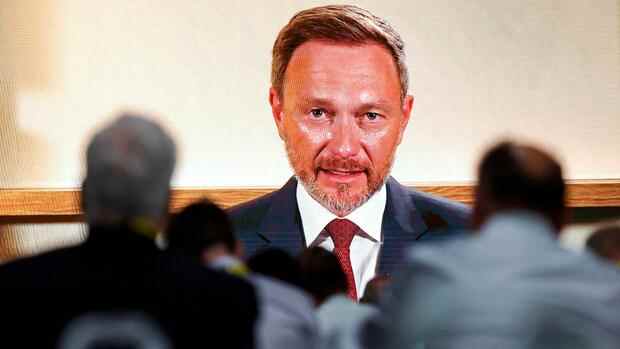Berlin Whether Christian Lindner (FDP) can personally present his figures to the Federal Cabinet is still open. The Federal Minister of Finance was still in quarantine in Washington on Monday because of a corona infection.
However, he will send the template for his supplementary budget to his cabinet colleagues beforehand. According to this, Lindner plans to increase the new debt by a further 39.2 billion euros in the current year, as reported in government circles.
In mid-March, Lindner had already introduced a draft budget to the cabinet that provided for borrowing of 99.7 billion euros. But even then it was clear: The figures are actually already outdated because of the Ukraine war. Lindner announced a supplementary budget as soon as the financial consequences for the budget are foreseeable.
This is now to be adopted by the cabinet on Wednesday. The supplementary budget will increase the planned new borrowing this year to a total of 138.9 billion euros. With the additional loans, the federal government is primarily reacting to the Ukraine war and its economic consequences.
Top jobs of the day
Find the best jobs now and
be notified by email.
On the one hand, shortfall in income must be covered. These are largely the result of the second relief package that the traffic light coalition had decided on and that should also be in the cabinet on Wednesday. This includes, for example, the energy price flat rate of 300 euros, with which the government wants to relieve citizens because of the sharp rise in electricity and heating costs, and an additional bonus of 100 euros in child benefit.
Read here: With which measures the traffic light coalition wants to relieve the citizens of energy prices.
Most of the new debt is earmarked for additional spending. These include new economic aid for companies affected by the effects of the Ukraine war. Economics Minister Robert Habeck (Greens) estimates around five billion euros for this. The Federal Foreign Office and the Development Ministry will receive an additional 1.5 billion euros for humanitarian aid. In addition, the federal government is increasing its spending on so-called military training from 200 million to two billion euros. Most of the money is supposed to go to Ukraine.
Union: “Linder is the king of debt”
In mid-March, Lindner emphasized that the supplementary budget should only finance expenditure related to Ukraine. The Ministry of Finance has been able to fend off many other greeds in recent weeks. “It remained a selective intervention,” emphasized in government circles. However, there will also be a few billion euros in the supplementary budget for the corona pandemic.
A total of 14 billion euros are included as provisions, according to government circles. This is also intended to finance additional expenses for vaccination centers and corona tests, some of which have already been approved in recent months but have not yet been included in the budget. In addition, the provision item also serves to protect against further effects of the war, such as falling tax revenues.
The opposition criticizes the fact that the supplementary budget is now also used to finance corona expenses. After all, Lindner had previously emphasized that without the Ukraine war he would have met the originally planned new debt of 99.7 billion euros. But in fact that would have been difficult for the Federal Ministry of Health because of the additional billions, as is now evident.
“Now it’s official: Federal Finance Minister Lindner is the king of debt,” said the budget spokesman for the Union faction, Christian Haase (CDU). The Union adds the planned special fund of 100 billion euros for the better equipment of the Bundeswehr to the 138.9 billion euros borrowing in the budget. This puts the debt at almost 240 billion euros – and thus higher than the previous record of 215 billion euros last year under the then Finance Minister and current Chancellor Olaf Scholz (SPD).
At the end of February, Scholz spoke for the first time in the Bundestag of a “special fund” for the Bundeswehr
(Photo: Reuters)
The Federal Ministry of Finance considers this bill to be dubious. After all, the special fund, which is secured by the Basic Law and runs alongside the debt brake, is intended to increase defense spending for a long time. The money will probably flow over five years. In this respect, the 100 billion loans could not simply be added to the new debt in full this year, according to the view.
One thing is clear: After the 138.9 billion euros in new debt in 2022, it will be difficult in the coming year to fully apply the debt brake again. To do this, the liabilities would have to be drastically reduced, so far Lindner is planning 7.5 billion euros for 2023. The goal of complying with the debt brake still applies, the Ministry of Finance emphasizes.
The Union is already raising doubts. “With this policy, it is a mystery to me how we can even get back on a virtuous budgetary path,” said CDU finance politician Haase. “It will be interesting to see whether the coalition will seriously challenge the debt brake and prefer to continue consuming the sweet poison of debt when the litmus test for 2023 with compliance with the debt brake is due.”
More: The fiscal illusion: In a few weeks, the traffic lights will drop the debt brake.

